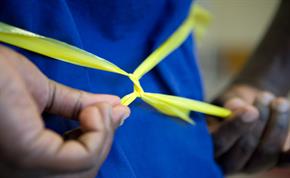
Following the ebola outbreak in Sierra Leone, Liberia and Guinea , EEAST has put in place full procedures to identify, treat and care for and transport a patient with any stage of ebola.
Action cards and standard operating procedures are in place in EOCs and 111; additional questions are being asked regarding travel to Sierra Leone, Liberia or Guinea, contact with known cases or handling of samples, so that early identification of cases and the risk to attending staff is assessed before any staff are dispatched.
Operational staff have been provided with information via flyers, posters, notices, procedures and action cards. Every ambulance and RRV has level one and level two risk personal protective equipment (PPE) that can be accessed immediately, should a case is identified. HART staff have been trained in the use and removal of their level three PPE, supplied by the National Ambulance Resilience Unit. A designated ebola ambulance has been fully prepared and kitted in the event of the need to take a patient with ebola to a specialist NHS unit. Staff should note that they will not be asked to transfer a confirmed ebola cases to specialist hospital care; this will be carried out by the HART team using specialist equipment.
We must be aware of any patient who presents with the following:
The use of strict IPC precautions, hand hygiene and PPE is required for suspected cases and please remember that the virus may be present in blood; body fluids, including urine; on contaminated instruments and equipment; in waste; on contaminated clothing; and on contaminated surfaces.
Please also read the urgent update, published in October, for full details on PPE needed.
If you have any concerns or questions or want advice about a confirmed or suspected case, please contact the on-call resilience manager (EOC can give you the necessary contact details) in the first instance, who can give you necessary guidance.
Published 29th January 2015